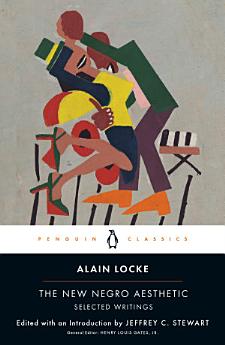The New Negro Aesthetic: Selected Writings
Jan 2022 · Penguin
4.0star
1 isibuyekezoreport
I-Ebook
480
Amakhasi
family_home
Kufanelekile
info
reportIzilinganiso nezibuyekezo aziqinisekisiwe Funda Kabanzi
Mayelana nale ebook
Pulitzer Prize-winning biographer edits a collection of Alain Locke's influential essays on the importance of the Black artist and the Black imagination
A Penguin Classic
For months, the philosopher Alain Locke wrestled with the idea of the Negro as America's most vexing problem. He asked how shall Negroes think of themselves as he considered the new crop of poets, novelists, and short story writers who, in 1924, wrote about their experiences as Black people in America. He did not want to frame Harlem and Black writing as yet another protest against racism, nor did he want to focus on the sociological perspective on the "Negro problem" and Harlem as a site of crime, poverty, and dysfunction. He wanted to find new language and a new way for Black people to think of themselves. The essays and articles collected in this volume, by Locke's Pulitzer Prize–winning biographer, are the result of that new attitude and the struggle to instill the New Negro aesthetics, as Stewart calls it here, into the mind of the twentieth century. To be a New Negro poet, novelist, actor, musician, dancer, or filmmaker was to commit oneself to an arc of self-discovery of what and who the Negro was—would be—without fear that one would disappoint the white or Black bystander. In committing to that path, Locke asserted, one would uncover a "being-in-the-world" that was rich and bountiful in its creative possibilities, if Black people could turn off the noise of racism and see themselves for who they really are: a world of creative people who have transformed, powerfully and perpetually, the culture of wherever history or social forces landed them.
A Penguin Classic
For months, the philosopher Alain Locke wrestled with the idea of the Negro as America's most vexing problem. He asked how shall Negroes think of themselves as he considered the new crop of poets, novelists, and short story writers who, in 1924, wrote about their experiences as Black people in America. He did not want to frame Harlem and Black writing as yet another protest against racism, nor did he want to focus on the sociological perspective on the "Negro problem" and Harlem as a site of crime, poverty, and dysfunction. He wanted to find new language and a new way for Black people to think of themselves. The essays and articles collected in this volume, by Locke's Pulitzer Prize–winning biographer, are the result of that new attitude and the struggle to instill the New Negro aesthetics, as Stewart calls it here, into the mind of the twentieth century. To be a New Negro poet, novelist, actor, musician, dancer, or filmmaker was to commit oneself to an arc of self-discovery of what and who the Negro was—would be—without fear that one would disappoint the white or Black bystander. In committing to that path, Locke asserted, one would uncover a "being-in-the-world" that was rich and bountiful in its creative possibilities, if Black people could turn off the noise of racism and see themselves for who they really are: a world of creative people who have transformed, powerfully and perpetually, the culture of wherever history or social forces landed them.
Izilinganiso nezibuyekezo
4.0
1 isibuyekezo
Mayelana nomlobi
Alain LeRoy Locke (1885–1954) was a philosopher, writer, and educator. He graduated with honors from Harvard University in 1907 and became the first African American to be selected as a Rhodes Scholar. After receiving a PhD in philosophy at Harvard in 1918, Locke returned to Howard and formed one of the first philosophy departments at a historically black college. Locke is best known as the creator of the philosophical concept New Negro which would initiate the Harlem Renaissance (1925–1939), a period of significant contributions of African American artists, writers, poets, and musicians. In 1925, he edited The New Negro: An Interpretation—an anthology of fiction, poetry, and essays on African and African American art and literature.
Jeffrey C. Stewart is a professor of black studies at the University of California, Santa Barbara. His biography The New Negro: The Life of Alain Locke was the winner of the 2019 Pulitzer Prize for Biography, the 2019 Mark Lynton History Prize, the 2019 James A. Rawley Prize, and the 2018 National Book Award in Nonfiction. He has been a Fulbright Professor of American Studies at the University of Rome III; a W. E. B. Du Bois and a Charles Warren fellow at Harvard University; and a lecturer at the Terra Foundation for American Art in Giverny, France.
Jeffrey C. Stewart is a professor of black studies at the University of California, Santa Barbara. His biography The New Negro: The Life of Alain Locke was the winner of the 2019 Pulitzer Prize for Biography, the 2019 Mark Lynton History Prize, the 2019 James A. Rawley Prize, and the 2018 National Book Award in Nonfiction. He has been a Fulbright Professor of American Studies at the University of Rome III; a W. E. B. Du Bois and a Charles Warren fellow at Harvard University; and a lecturer at the Terra Foundation for American Art in Giverny, France.
Nikeza le ebook isilinganiso
Sitshele ukuthi ucabangani.
Ulwazi lokufunda
Amasmathifoni namathebulethi
Faka uhlelo lokusebenza lwe-Google Play Amabhuku lwe-Android ne-iPad/iPhone. Livunyelaniswa ngokuzenzakalela ne-akhawunti yakho liphinde likuvumele ukuthi ufunde uxhunywe ku-inthanethi noma ungaxhunyiwe noma ngabe ukuphi.
Amakhompyutha aphathekayo namakhompyutha
Ungalalela ama-audiobook athengwe ku-Google Play usebenzisa isiphequluli sewebhu sekhompuyutha yakho.
Ama-eReaders namanye amadivayisi
Ukuze ufunde kumadivayisi e-e-ink afana ne-Kobo eReaders, uzodinga ukudawuniloda ifayela futhi ulidlulisele kudivayisi yakho. Landela imiyalelo Yesikhungo Sosizo eningiliziwe ukuze udlulise amafayela kuma-eReader asekelwayo.






